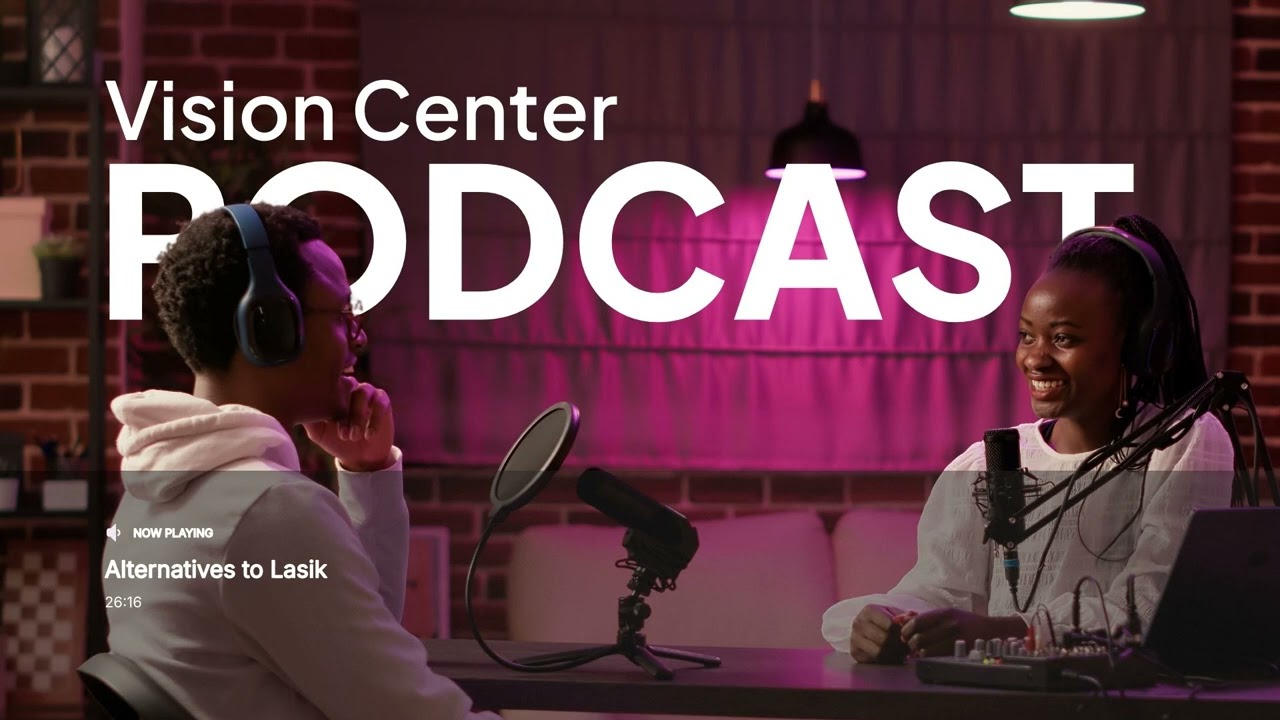Many people explore alternatives to LASIK for various reasons. Whether it's due to specific eye conditions, personal preferences, or lifestyle considerations, there are several other procedures that can help you achieve clearer vision.
Let’s discuss six popular alternatives to LASIK, weighing their pros and cons, costs, and factors to consider when making your decision.
6 Alternatives to LASIK Eye Surgery
Although LASIK is a great procedure with fast results, it’s not for everyone. Fortunately, there are various alternatives that can be used for people who aren’t good candidates for LASIK.
Listen In Q&A Format
Alternatives to Lasik
Vision Center Podcast
Here’s a breakdown of some of the most popular alternatives for LASIK:
- Photorefractive keratectomy (PRK). Removes the corneal epithelium to expose the cornea for treatment with an excimer laser.
- Laser epithelial keratomileusis (LASEK). Uses a special microkeratome device that exposes the cornea to an alcohol solution.
- Small incision lenticule extraction (SMILE). Creates a smaller incision to remove a tiny disc of tissue inside the cornea.
- Refractive lens exchange (RLE). A procedure that involves implanting artificial lenses in the eyes to enhance vision, eliminating the need for replacement lenses and glasses.
- Intraocular lens (IOL) implants. IOLs involve implanting an artificial lens into the eye to treat refractive errors.
- Phakic Intraocular lens implants. Involves placing implantable contact lenses behind the iris and in front of the natural eye lens to correct your refractive errors.
Pros and Cons of Alternative LASIK Procedures
| Procedure | Pros | Cons |
| Photorefractive keratectomy (PRK) | Good for people with dry eyes or thin corneas, doesn’t create a flap, low risk of complications | Undercorrection or overcorrection, may worsen vision, requires a bandage contact lens |
| Laser epithelial keratomileusis (LASEK) | Ideal for thin or flat corneas, high chance of success, vision can be 20/40 or better | Possibility of undercorrection or overcorrection, corneal thinning, prolonged recovery (6 to 9 months) |
| Small incision lenticule extraction (SMILE) | Uses a very small incision, doesn’t require a flap, low risk of complications | Risk of undercorrection, prolonged recovery period, requires bandage contact lenses |
| Refractive lens exchange (RLE) | Prevents cataract development, involves a short recovery period, provides a permanent solution and better visual quality | Not ideal for some eye conditions, more invasive than LASIK, costs more than LASIK |
| Intraocular lens (IOL) implants | Minimal upkeep, can treat severe myopia, cheaper compared to replacement glasses or contacts | Might cause halos, increased risk of cataract surgery complications, increased intraocular pressure |
| Phakic intraocular lens implants | Ideal for people with higher amounts of myopia, results in 20/20 vision or better, minimal to no maintenance | Not covered by insurance because it’s an elective surgery, has an age limit of 21 to 45 years, more expensive than laser treatments |
How Much Do These Procedures Cost?
Unfortunately, the cost of these procedures can be very high. Some, like PRK, RLE, IOL, and phakic IOLs, are considered elective surgeries, so your insurance won’t cover them.
Here’s a breakdown of the cost of each procedure:
- PRK. Costs between $1,800 and $4,000.
- LASEK. Costs between $1,800 and $5,000.
- SMILE. Costs about $2,361 per eye.
- RLE. Can range anywhere from $2,500 to $4,500 per eye.
- IOLs. Costs between $1,500 and $3,000 per eye.
- Phakic IOL. Can cost $4,000 or more per eye.
Keep in mind that the price for each procedure depends on several factors, such as your provider, location, and the pre/post-op care they provide.
In some cases, your insurance provider may cover some of the cost of the procedure if it’s considered medically necessary. For example, if your cataracts are severe, the insurance company may cover the cost of IOLs.
Which Eye Surgery is Right for You?
Choosing which eye surgery is best for you depends on various factors like your prescription, corneal shape, age, lifestyle, etc. Fortunately, you can talk to an eye doctor about these options. They’ll give you a recommendation based on your condition, eligibility, and vision goals.
While you’re deciding on which eye surgery to undergo, you should consider the following factors:
- The surgeon’s experience and access to the latest advancements in surgery
- How comfortable you feel around them
- Costs
- Risks and benefits
- Recovery period
These procedures can also be combined to improve vision. For example, someone over 40 who's mildly nearsighted might get LASIK and have one eye tweaked slightly to help with reading.
The best eye surgery for you depends on your individual needs and circumstances. We encourage you to consult a qualified eye care professional to discuss your options and determine the most suitable procedure for your vision goals.
In this article








